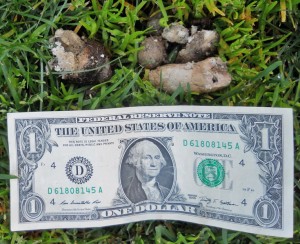Nutrition 101 for Older Dogs
As dogs age, their metabolism slows down, their exercise level decreases, their organ function decreases, and their need for a high quality easily-digestible food increases. A proper diet for older dogs should be supportive of all organ systems, and should not place an undue burden upon the dog’s digestive system, kidneys, or liver (all three of which tend to show decreased function as dogs age).
A proper diet for older dogs should meet the following guidelines:
- Highly digestible
- Contains high quality, animal-based protein
- Low in carbohydrates
- Maintains healthy teeth and gums
Highly Digestible: Any diet for a senior dog must be easily digested by the dog. If the dog cannot digest the food properly or easily, then he will not receive adequate nutrition from that food, no matter how “nutritious” the label says it is.

Actual day-old poop from a 93lb, raw-fed German Shepherd Dog. Small, well-formed feces indicate a highly digestible food!
Most commercial foods for older dogs contain large amounts of fiber and filler, which fill the dog up without actually providing any beneficial nutrition. The easiest measure of digestibility is poop: if what comes out the other end of the dog is a huge, stinky, soft pile of feces, then that tells you the food is not being utilized by the dog. When fed the proper food, the dog’s feces will be small and well-formed, no matter what the size of the dog!
High-Quality Protein: good sources of protein are essential for older dogs1. One of the nutritional myths floating around out there is that too much protein can be bad for the kidneys of older dogs. What the scientific research actually shows is that older dogs need a high quality, easily-digestible amount of protein in their diets to support kidney function and help maintain muscle mass. Additionally, protein is the basic building block in living things, and is used to create muscle, skin, hair, enzymes, and more. Because aging slows the regenerative processes in the dog’s body (processes that use proteins to rebuild and repair tissue), a proper amount and form of protein is essential to the older dog’s diet.
Low Carbohydrates: It is of crucial importance to keep your older dog lean and trim, and to help maintain the dog’s muscle mass in order to maintain mobility. Protein, not carbohydrates, will do this; therefore, look for a low-carbohydrate food. A diet high in carbohydrates, on the other hand, will promote weight gain, muscle loss, and inflammation in older dogs. The dog’s body will lay down a layer of subcutaneous fat that makes the dog look soft, doughy, and undefined, no matter how little food that dog eats. The high level of carbohydrates can also aggravate inflammatory conditions like arthritis and inflammatory bowel disease. If the dog is moving around stiffly, gaining weight, and looking “soft” despite receiving decreased amounts of food, then switch to a better food that is lower in carbohydrates and higher in protein.
Clean teeth and gums: Periodontal disease is a raging problem in the pet population, with an estimated 85% of dogs over the age of 4 having gum disease. This is especially critical for older dogs, as unhealthy gums and teeth continually flood the dog’s body with bacteria and toxins. This has been shown to have negative effects on all major organ systems2! Thus, maintaining the health of your older dog’s mouth is very important. Do check your dog’s teeth regularly to look for cracked or abscessed teeth, and consider a teeth-cleaning for your senior canine if their teeth are tartar-covered and their breath is stinky. Most importantly, feed a diet that supports oral health. Commercial foods do not support oral health, no matter what their claims. If they did support oral health, then 85% of dogs over the age of 4 would not have periodontal disease!
Here at German Shepherd Watchdogs, we feed our older dogs the same type of raw diet that we feed our younger family protection dogs, our competition dogs, and our German Shepherd Dogs for sale. This diet meets all of the above criteria; it provides dogs with fresh, real food that is easy to digest, has high quality protein and low carbohydrate levels, truly cleans teeth as they chew, and hydrates the dog as they eat it (unlike dry processed foods that dehydrate the animal). Nutrition is the cornerstone of health at every age, and we have had great success with this type of diet.
Next blog we will discuss helpful supplements for older dogs.
Happy feeding,
CK


